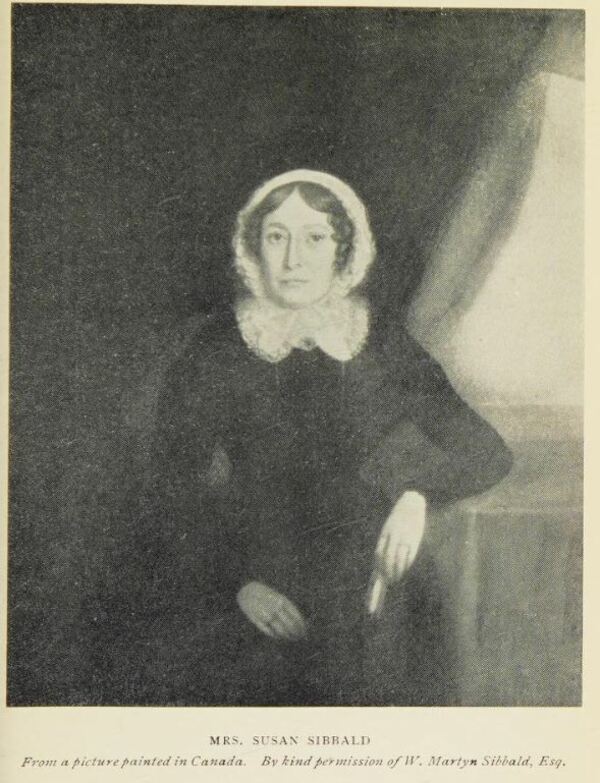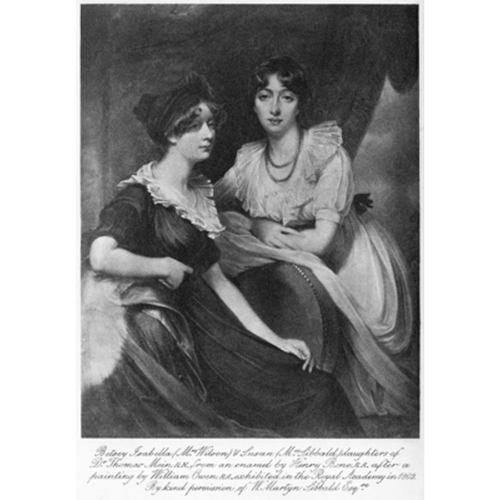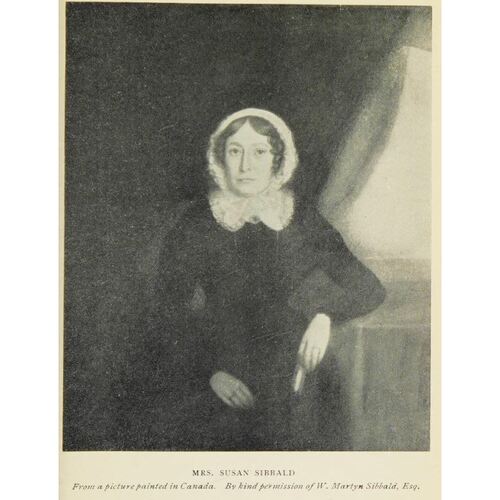
Source: Link
MEIN, SUSAN (Sibbald), memoirist; b. 29 Nov. 1783 at Fowey, Cornwall, England, fifth daughter of Thomas Mein, physician in the Royal Navy, and Margaret Ellis; d. 9 July 1866 at Toronto, Canada West.
Susan Mein spent her childhood in Cornwall, first at Fowey, and then at Devonport where Thomas Mein was appointed inspector of hospital ships in 1795. From 1797 to 1800 she attended Belvedere House, a fashionable boarding-school in Bath, and, following her début, spent winters in London and summers in Scotland at Eildon Hall, her father’s estate near Melrose. In 1807 she married William Sibbald, colonel in the 15th Regiment of Foot; they were to have two daughters and nine sons.
Susan Sibbald and her son Archibald came to Upper Canada in October 1835 to visit two other sons, William (founder in 1833 of a short-lived monthly literary magazine in York (Toronto), the Canadian Magazine) and Charles, who had both immigrated several years before. Mrs Sibbald purchased, probably for William and Charles, 500 acres and a log house on the south shore of Lake Simcoe, near the present site of Jackson’s Point, and named it Eildon Hall. In March 1836 she returned to Scotland to find that her husband had died in her absence; the following October she arrived back in Canada with her three youngest sons to settle at Eildon Hall, carving out of the Canadian wilderness a thoroughly British oasis of culture and comfort. The estate soon boasted traditional gardens, imported trees, and a heated greenhouse; it became the setting for a social life which Susan made as similar as possible to that which the family had enjoyed in Britain. She was also instrumental in 1838 in building St George’s Anglican Church on her property.
In September 1843 Mrs Sibbald returned to Britain, remaining there until 1856, when she came back to Canada with her second son, Captain Thomas Sibbald, author of A few days in the United States and Canada, with some hints to settlers (London, [1846]). Mrs Sibbald spent the remaining ten years of her life in Toronto, keeping up friendships she had made previously with Bishop John Strachan, Admiral Augustus Warren Baldwin, Sir John Beverley Robinson, William Henry Boulton*, and other members of the Family Compact with whose attitudes she sympathized. She believed firmly in maintaining the class distinctions of the old world and saw the city’s rising merchants and financiers as parvenus who were usurping social leadership. In her last years she often lamented the decline of old values and the disappearance of the first generation of Toronto’s Tory families. She tried to pass on to her grandchildren her sense of loyalty to British customs and institutions and took pride that, in addition to her father and husband, eight of her nine sons held commissions in either the Royal Navy, the Indian army, or the Canadian militia.
While living in Toronto Mrs Sibbald wrote an autobiography of the first 29 years of her life, which was later edited by her great-grandson, Francis Paget Hett, and published in 1926. Her Memoirs show her to be an accomplished writer with a good sense of dialogue, discrimination in detail, and skill in characterization. Family friends who appear in the Memoirs include the satiric poet John Wolcot (“Peter Pindar”), novelists Sir Walter Scott and G. P. R. James, and painters William Owen and Henry Bone. The most delightful character in the Memoirs, however, is Susan Sibbald herself, with her sprightly outlook on life, sense of humour, and spirit of adventure. Her personality made it easy for her to adapt to life in Canada, and her letters reveal that she kept her zest for living undiminished in her old age. She died in Toronto in 1866 and is buried at Jackson’s Point.
PAO, Thomson (John), diaries, 1821–26, 1833–38. Sibbald Memorial Museum (Sibbald Point Provincial Park, Ont.), Sibbald papers, diary of Hugh Sibbald, 1842–44; diary of John Sibbald, 1840–42; Susan Sibbald, journals, 1849–66, and letters, 1858–66. [Susan Mein], The memoirs of Susan Sibbald, 1783–1812, ed. F. P. Hett (London, 1926). Canadian Magazine (York [Toronto]), January–March 1833. Craig, Upper Canada. F. P. Hett, Georgina: a type study of early settlement and church building in Upper Canada (Toronto, 1939), 85–86. Susanna [Strickland] Moodie, Life in the clearings versus the bush (London, 1853). M. E. Fowler, “Portrait of Susan Sibbald: writer and pioneer,” OH, LXVI (1974), 51–64:
Cite This Article
Marian E. Fowler, “MEIN, SUSAN (Sibbald),” in Dictionary of Canadian Biography, vol. 9, University of Toronto/Université Laval, 2003–, accessed January 1, 2026, https://www.biographi.ca/en/bio/mein_susan_9E.html.
The citation above shows the format for footnotes and endnotes according to the Chicago manual of style (16th edition). Information to be used in other citation formats:
| Permalink: | https://www.biographi.ca/en/bio/mein_susan_9E.html |
| Author of Article: | Marian E. Fowler |
| Title of Article: | MEIN, SUSAN (Sibbald) |
| Publication Name: | Dictionary of Canadian Biography, vol. 9 |
| Publisher: | University of Toronto/Université Laval |
| Year of publication: | 1976 |
| Year of revision: | 1976 |
| Access Date: | January 1, 2026 |




